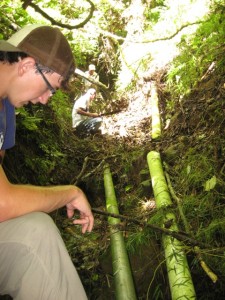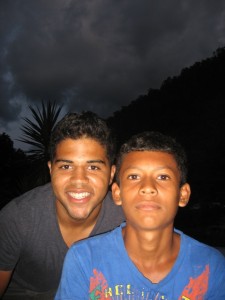Lafayette’s chapter of Engineers Without Borders (EWB) is one of three in the nation to be named a 2013 Premier Project by EWB-USA, the organization’s highest honor. It was selected from more than 250 chapters across the nation working on more than 350 projects.
Since 2006, Lafayette has been working with residents of El Convento, a remote village of about 180 people in Honduras, to build a water treatment and distribution system. After the community’s water system was destroyed by Hurricane Mitch in 1998, residents collected water from a polluted stream.

Kevin McHugh ’15 works with Honduran villagers.
The chapter has successfully fostered long-term, meaningful relationships with El Convento—especially difficult since students can travel at most twice a year to Honduras. The community has a water board that helps maintain the relationship with the College between trips.
“My involvement in El Convento has taught me the importance of keeping the community you are working with involved in the project and making noticeable progress. The more involved the community is, the more successful the project will be,” says Anthony Vecchio ’14 (Baldwinsville, N.Y.), a chemical engineering major. “The most rewarding part has been seeing the joy on the faces of the community members when we travel to their village, especially the children. We are trying to provide them with clean water, [a resource taken for granted] in many societies, but one that can affect all aspects of the villagers’ lives.”
The infrastructure now in place includes a water collection dam, water collection box, water storage tank, three slow sand filters, and two-thirds of the water distribution pipe network. The project is now at the stage of constructing pilas (washing sinks) for each household in the community.
Slow sand filtration is a water treatment method in which water passes through several layers of sand and gravel, as well as a small biological layer, and exits as potable water. The biological layer, comprised of bacteria and microorganisms found in normal creek water, is perhaps the most important, as it kills 99 percent of harmful biological agents in the water.
Although the students have been able to use their engineering know-how in the field, they have learned about much more than just engineering.

Andy Munoz ’15, left, makes a new friend.
“EWB has given me an opportunity to use the technical skills I learned here at Lafayette to implement a water system that actually helps real people,” says Stephen Berkin ’14 (Morrisville, Pa.), a civil engineering major and leader of the slow sand filter team. “It has also taught me that sometimes feasibility or compatibility with the community and its needs is of greater importance than many of the technical concerns.”
Three professional mentors, Reed Colton, Doug Jones, and Emils Schnore, have contributed significantly to the project’s success. They have each traveled several times with the students to Honduras to work on this project and have also served as design consultants to Lafayette’s student chapter. In addition to El Convento, the students have installed a similar system in the neighboring village of Lagunitas.
Experience in the field is invaluable to students as they prepare for engineering careers.
“Being involved in the EWB projects allow students, who are still early in their studies, to experience design work. They can get involved in brainstorming solutions and in designing system components even when they are first-year students and sophomores,” says mentor Anne Raich, associate professor of civil and environmental engineering. “As upperclassmen, EWB lets students gain more technical design experience and also gain experience in implementing and troubleshooting the designs developed.”
Working on the water systems in El Convento and Lagunitas helps students realize the importance of developing effective solutions that are sustainable for the community.
“My trip to Honduras was a humbling experience in which I witnessed the true meaning of dedication and hard work,” says Andy Munoz ’15 (New York, N.Y.), cultural team leader. “Growing up in the inner city I always thought I had it rough; however, immersion in La Fortuna and El Convento challenged my initial assumption. Knowing that in some way my actions are giving an individual the opportunity to live a more prosperous life is truly rewarding.”


2 Comments
The work these students do is truly inspiring! Lafayette provides these incredible opportunities to students, but they transform the experience by their dedication, natural curiosity, and generosity of spirit. Well done!
Comments are closed.